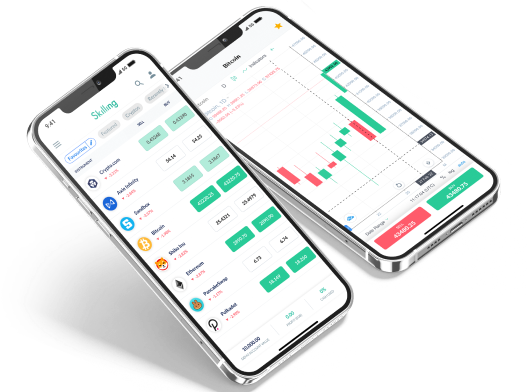Understanding deflation is important for investors and financial experts alike. Deflation, often regarded as a silent economic menace, can have profound implications, ranging from diminished wages to prolonged unemployment and even the looming shadow of recession.
But what exactly is deflation, and why should you care? In this article, we look into the effects of deflation in 2024, exploring its causes, effects, and the measures that can be taken to navigate this economic landscape.
Deflation definition:
Deflation, in the context of 2024's economic landscape, is characterised by a persistent decrease in the general price level of goods and services. It's essentially the opposite of inflation and occurs when there is a sustained reduction in the supply of money or credit within an economy. This decrease in the overall price level may seem appealing at first glance, but it carries significant economic implications that extend far beyond lower prices on consumer goods
Investors and financial experts alike know that deflation can have serious implications on the economy, leading to decreased wages, prolonged unemployment, and possibly even a recession. But what exactly is deflation? What causes it? And more importantly, how can measures be taken against it when faced with a situation of deflation?
Experience Skilling's award-winning platform
Try out any of Skilling’s trading platforms on the device of your choice across web, android or iOS.
71% of retail CFD accounts lose money.

Causes of deflation:
Deflation can arise from a range of factors, both on the supply side and the demand side. On the supply side, it often occurs when there's an oversupply of goods and services in the market. Businesses may flood the market with more products than consumers demand, resulting in price reductions across various industries. Additionally, increased competition can drive companies to lower their prices to attract more customers, contributing to deflationary pressures.
On the demand side, deflation can be mainly attributed to decreased purchasing power and increased savings tendencies due to economic uncertainty. In some regions, like Brazil and Cuba, for example, weakened currencies can limit citizens' ability to make purchases, leading them to save rather than spend their money. Regardless of its origins, deflation can trigger a cascade of economic consequences, from reduced prices to job losses, affecting all levels of society.
Deflation example:
As of 2024, several countries around the world are grappling with deflationary challenges. Here are a few notable examples:
Japan: Japan stands as one of the most prominent examples of a country experiencing prolonged deflation. Since the 1990s, Japan has struggled with a deflationary environment attributed to factors like an aging population, slow economic growth, and high public debt. The Bank of Japan has implemented various monetary policies to stimulate demand and inflation, but the country continues to face sluggish growth and weak consumer prices.
Italy: Italy, despite being one of the largest economies in the European Union, has also encountered deflationary pressures. Economic stagnation, high public debt, and a lack of structural reforms have contributed to this situation. In 2022, Italy experienced a decline in consumer prices, with inflation falling by 0.1%, indicating deflationary tendencies.
Other Countries: Other nations, including Greece and Argentina, have faced deflationary challenges. Greece has been dealing with a debt crisis since 2009 and saw a 1.3% decline in consumer prices in 2022. Argentina, plagued by a currency crisis and high inflation, also witnessed a decrease in consumer prices in 2022.
Effects of deflation:
Deflation carries a series of effects that can significantly impact both individuals and economies. Some of these effects include:
- Decreased consumer spending: As prices fall, consumers may delay purchases, anticipating even lower prices in the future. This reduced spending can lead to decreased demand for goods and services, affecting businesses and potentially leading to layoffs.
- Lower business profits: Businesses face the challenge of maintaining profitability as prices decline. Reduced revenue can result in decreased profits, potentially leading to cost-cutting measures and further economic strain.
- Increased real debt burden: While falling prices may seem advantageous, they can also increase the real burden of debt. Fixed loan payments become relatively more expensive, making it challenging for individuals and businesses to service their debt.
- Deflationary spiral: A prolonged period of deflation can lead to a deflationary spiral, where falling prices and decreased demand reinforce each other, creating a vicious cycle of economic decline.
Consequences of deflation:
The consequences of deflation are far-reaching and extend beyond lower prices. They can include:
- Job losses: Reduced consumer spending and business profitability may lead to layoffs and job losses, impacting employment rates.
- Decline in economic growth: A deflationary environment can hinder economic growth as businesses struggle to thrive in a low-demand market.
- Increased debt burden: Falling prices can increase the real burden of debt for individuals and businesses, making it harder to manage loans and financial obligations.
- Risk of deflationary spiral: Prolonged deflation can trigger a deflationary spiral, where falling prices lead to even lower demand, creating a self-reinforcing cycle of economic decline.
Measures against deflation:
When facing deflation governments and central banks are implementing a range of measures to combat its adverse effects on the economy. These measures include:
- Altering interest rates: One common approach is to adjust interest rates. Central banks may lower interest rates to encourage borrowing and spending, thus stimulating economic activity.
- Implementing tax cuts: Tax cuts are another tool used to boost consumer spending. Lower taxes can leave individuals with more disposable income to spend on goods and services.
- Government borrowing: Governments may resort to borrowing to finance infrastructure projects and stimulate demand. This can inject money into the economy, helping to counter deflation.
- Monetary policies: Central banks may employ unconventional monetary policies, such as quantitative easing, to increase the money supply and support lending.
- Economic stimulus packages: Governments may roll out economic stimulus packages to provide financial assistance to individuals and businesses, promoting spending and investment.
- Encouraging investment: Measures to encourage business investment can help spur economic growth and counteract deflationary pressures.
Explore
Ways to benefit from a period of deflation
One of the biggest benefits of a period of deflation is the potential to grow investments. Deflation encourages thrifty spending, which can result in investors accumulating wealth over time.
For example, stocks that were previously too expensive or out of reach can be purchased at much lower prices due to a decrease in value caused by deflation. Additionally, those looking to buy real estate can find great bargains during a period of deflation since housing prices tend to fall. From diversifying one's portfolio to expanding their property portfolio, there are many ways to benefit from a period of deflation if it is approached wisely with an eye toward long-term investment strategies.
Important! Deflation should not be taken lightly as it has a larger economic impact than inflation. Its causes can vary from supply-side to demand-side issues, so it is essential to identify the underlying source
Summary
In summary, it's essential to understand the nuances of this economic event. While falling prices may appear appealing, they carry profound implications that extend beyond the surface. To truly understand deflation, one must consider its causes, effects, and the measures governments and central banks are undertaking to mitigate its adverse impact.
The examples of countries facing deflation, such as Japan, Italy, Greece, and Argentina, underscore the global relevance of this economic challenge. These nations grapple with a confluence of factors, from an aging population to high public debt, all contributing to the persistence of deflationary pressures.
To navigate the deflation landscape, individuals and businesses alike should consider employing hedging strategies. Hedging involves safeguarding assets and investments from the adverse effects of deflation. Diversifying investment portfolios, exploring low-risk options like Index Funds or Exchange Traded Funds (ETFs), and utilizing tools like CFD trading for both rising and falling markets can all be effective hedging tactics.
Timing plays a pivotal role in hedging strategies during deflationary conditions. Understanding market cycles and strategically timing market entry and exit points can be the key to preserving wealth and capitalizing on opportunities.
In conclusion, deflation in 2024 is an economic challenge that demands careful consideration. By understanding its origins, effects, and the measures being implemented, individuals and businesses can navigate these uncertain waters effectively. Employing hedging strategies, diversifying portfolios, and staying informed about market trends are pivotal to making informed decisions and safeguarding financial well-being during deflationary times
What's your Trading Style?
No matter the playing field, knowing your style is the first step to success.

FAQs
What is deflation, and how does it differ from inflation?
Deflation is a persistent decrease in the general price level of goods and services within an economy. It stands in contrast to inflation, where prices tend to rise over time. While inflation erodes the purchasing power of money, deflation can lead to reduced consumer spending and economic challenges.
What are the signs of deflation?
Signs of deflation often include falling prices, reduced consumer spending, declining business profits, and job losses. Additionally, central banks may lower interest rates to combat deflationary pressures.
How can individuals protect themselves during deflation?
To protect themselves during deflation, individuals can consider diversifying their investment portfolios, exploring low-risk options like Index Funds or Exchange Traded Funds (ETFs), and staying informed about market trends. Hedging strategies, such as CFD trading, can also be effective in volatile markets.
What measures are governments taking to combat deflation in 2024?
Governments are implementing various measures, including altering interest rates, implementing tax cuts, and engaging in government borrowing to stimulate economic activity. These measures aim to counter the effects of deflation and promote economic growth.
How does timing play a role in hedging strategies during deflation?
Timing is crucial in hedging strategies during deflationary conditions. Understanding market cycles and strategically timing market entry and exit points can help individuals and businesses preserve wealth and capitalize on investment opportunities.
Are there opportunities to benefit from deflation?
Yes, deflation can present investment opportunities. During periods of deflation, assets such as stocks and real estate may become more affordable, offering potential long-term benefits for investors who make informed decisions.











